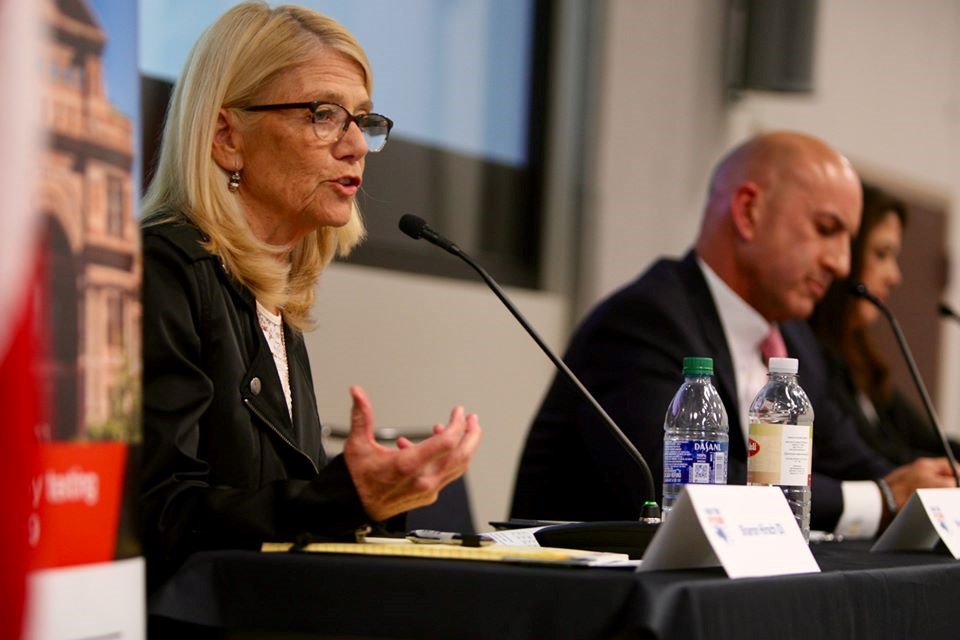The forum was nearing a calm ending Thursday evening when the event’s moderator posed a question to the three candidates for Texas’ 66th state house district.
“What are the greatest challenges facing this district’s public schools,” she asked, “and what will you do to address them?”
It was candidate Sharon Hirsch’s turn to answer, but for a moment, she paused. So did the crowd of three dozen or so educators, each of whom had showed up to Plano ISD’s Sockwell Center to learn about the three candidates vying to represent their district. While Hirsch thought about the question, the audience waited to hear how the candidate — and her two opponents — would fight for Plano schools.
The event was one of 40 “For the Future” forums sponsored by the organization Raise Your Hand Texas, a nonprofit focused on improving public education.
“We’re here to talk about the most important issues impacting our students,” said Missy Bender, the organization’s regional advocacy director for Collin and Denton counties. “We’re here to talk about the future of our children, and the future of Texas.”
After a brief meet-and-greet with the event’s few dozen attendees, Republican incumbent Matt Shaheen and his two Democratic challengers — Hirsch and Aimee Garza Lopez — took the stage in an expansive room in the Sockwell Center. The crowd of teachers looked on while a moderator asked each candidate how they would equip public schools and their students for the future, and the wide-ranging discussion touched on everything from vouchers to school finance and safety. Each candidate expressed unyielding optimism about the future of Plano schools, even as they strived to distinguish themselves from one another ahead of the March 3 Democratic primary and the November 3 general election.
“The future is bright for our schools,” said Shaheen, the incumbent who is unopposed from his party. “And that’s because we have the funding in place to continue the 98 percent graduation rate we’ve seen the past few years.” (The most recent data reveals the graduation rate in 2018 was 93 percent.)
Shaheen has represented the 66th district since 2015, and most recently defeated Hirsch in the 2018 election by just 391 votes. Shaheen is a member of the Texas Freedom Caucus, a legislative caucus in the state House that, according to the group’s website, supports “liberty-minded, grassroots Texans who want bold action to protect life, strengthen families, defend the U.S. and Texas Bills of Rights, restrain government and revitalize personal and economic freedoms in the State of Texas.”
Throughout the night, Shaheen railed against “Robin Hood, the State’s Recapture Tax. Because the city of Plano is classified as “property wealthy,” the school district is currently required to send millions of dollars in tax revenue to the state, which then distributes that revenue to districts designated “property poor.” According to Plano ISD’s website, since its implementation in 1993, this tax has sent more than $1.9 billion in Plano taxpayer funding to other school districts.
“Robin Hood is one of the main reasons I ran for office,” Shaheen told the crowd at Thursday’s event. “Getting rid of it will help us with sustainability.”
Shaheen calls for a repeal of “Robin Hood.” Hirsch and Lopez agreed that Robin Hood is flawed, but did not call for a repeal.
“We can sit here and say, ‘Get rid of Robin Hood,’ but there has to be a solution,” Hirsch said. She advocated for “carving our funding from the existing tax code”, thereby maintaining financial support for “property poor” school districts and keeping more Plano taxpayer funds in Plano.
The three candidates unanimously agreed that public funds should be reserved for public schools, and opposed the use of vouchers for private schools.
“Our constitutional mandate is free public schools,” Hirsch said. “There should be no diversion of public money to private schools.”
The candidates also seized the forum as an opportunity to highlight their vastly different backgrounds. Shaheen touted his experience at the State House and his connections to local corporations and teachers, and Hirsch cited her background as an employee of the school district, while Lopez, perhaps the least known candidate in the race, told the audience about her family history.
“My great grandparents were in segregated schools,” she said. “My father was sent to vocational high school, because if you were Mexican American on the southside of San Antonio, that’s where you went. He wanted to take a Physics class, so he fought for it until they let him and two other students take one. This is personal for me. Public education gave me the opportunities. It needs to be funded fully.”
The candidates also disagreed on national issues like gun laws and school safety. While Shaheen advocated for increased spending on public school security measures, Lopez vouched for “common sense gun laws.”
As the forum neared its end, the moderator read audience questions, and prompted Hirsch to relate what she felt was the biggest challenge facing schools in House District 66. Hirsch paused, surveyed the roomful of teachers, then spoke.
“You know, fortunately, our schools are fantastic,” she said. “And our teachers have done an expert job despite underfunding. Moving forward, we have to make public schools a priority.”
After the forum ended, attendees milled about the room, conferring with candidates and one another. Some praised Shaheen; some expressed excitement about the perspective Hirsch and Lopez would bring to their district.
“I don’t know who I’m going to vote for,” admitted one attendee, a local history teacher who preferred to remain anonymous. “But I know I’m going to vote.”
The Democrtatic primary between Hirsch and Lopez is March 3, and the general election will be held November 3.




